Message from the Director of China Centre
 |
 |
"Hi, welcome to Feb issue of MBS China Centre Newsletter!
I hope you all enjoyed a wonderful Chinese New Year holiday and are full of all the immediate “best wishes” on a Horse’s back!
Centre wise, we’ve just got a very busy week as the new semester started and quite a few workshops are running at the same time in the centre. However, it is always great to see students back to study at the centre and bring us interesting updates of their personal and professional development stories.
As you may know we kicked off July14 recruitment of Global MBA and marketing team have got many enquires right after the new year break. In the coming months more events are planned and we are quite confident we will have another successful cohort with quality in July.
Our Global Executive MBA, which is MBS’ flagship programme recently launched worldwide in UK, Dubai and Shanghai, has got quite a few top quality applications worldwide despite fierce competition in the regions. 1programme, 20 months, lifelong of difference! Please do spread a word of this exciting EMBA programme to these people you know who are outstanding with high aspirations to be tomorrow’s business leaders! “
Sherry Fu
Regional Director, China
sherry.fu@mbs.ac.uk
 |
|
 |  |
Global MBA Workshop Taster: Strategic Process Improvement
On 26 Feb, 2014, Manchester Business School China Centre offered an open class on Strategic Process Improvement at new China Centre in Shanghai. More than 20 company executives and managers attended the class.
On 26 Feb, 2014, Manchester Business School China Centre offered an open class on Strategic Process Improvement at new China Centre in Shanghai. More than 20 company executives and managers attended the class.
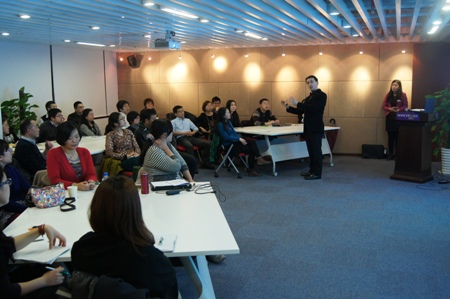
The class was delivered by Professor David Bamford, who is Professor of Operations Management of Manchester Business School. Professor David Bamford is an experienced industrialist and academic with multiple publications to his name, including a co-authored book (Essential Guide to Operations Management: Concepts and Case Notes, 2010).
Professor David Bamford’s research interests are focused towards operations improvement strategies, specifically in: the application of Operations Management theories in the service sector; strategic organisational change; leadership and quality management; and most recently in sports operations management.
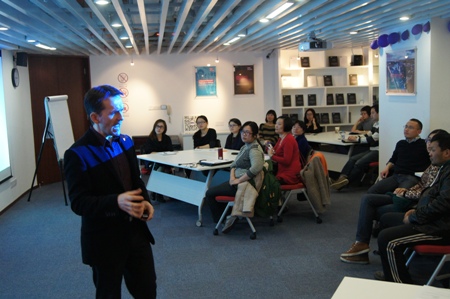
In this open class, Professor David Bamford gave a broad view on strategy with practical and interesting illustrations with the application of the ‘Manchester Method’. It examines how real operational problems can be solved and will explore a variety of strategic models that pertain directly to process improvement, taking participants through a structured diagnostic and implementation approach.
During the class, Professor David Bamford also commented that all the strategy management models are just the strategic analysis tools, to manage a company requires a whole bunch of quality, you cannot judge the failure and success of a company for only one dimension, the failure of the company cannot make the strategy management model worthless, instead, it serves the function that help the management to know their organization better.
Sherry Fu, Director of Manchester Business School China Centre attended the class, and introduced the audience to Manchester Business China Centre and the Global MBA Programme. The class content taught at this time is just one part of Manchester Business School Global MBA Strategic Management module.
Manchester Business School is one of the first business schools in the UK and becomes a global leading business education provider after nearly 50 years development. MBS China Centre which was launched in 2008 is committed to provide world-class business education opportunities to the Chinese people, continuously making contribution to the society and development of regional education.
 |
|
 |  |
Promoting Preparation for the 3rd Asia-Pacific Business School Desert Competition
The 3rd Asia-Pacific Business School Desert Competition will be held during 30 April to 3 May, 2014. The kick-off meeting was held on 12 February in MBS China Centre. 13 Global MBA students and Ms. Yiyi Chen, External Officer of China Centre attended the meeting. Being the 1st British business school invited by the organiser, it is an honour as well as an opportunity for MBS China students to network with students from top tier Asia-Pacific business schools.
The 3rd Asia-Pacific Business School Desert Competition will be held during 30 April to 3 May, 2014. The kick-off meeting was held on 12 February in MBS China Centre. 13 Global MBA students and Ms. Yiyi Chen, External Officer of China Centre attended the meeting. Being the 1st British business school invited by the organiser, it is an honour as well as an opportunity for MBS China students to network with students from top tier Asia-Pacific business schools.
MBS team leader, Mr. Zhang Yunfei (Global MBA 2013), introduced the game organization, prevailing progress, and game rules. The first round of the game will have about 50,000 participants from 40 top business schools in Asia-Pacific region. The game players will walk 70 km and pass through Tengri Desert located in Inner Mongolia. Through this game, game players can experience life in desert and realise the importance of environmental protection. This competition urges team spirit that is crucial to win the game.
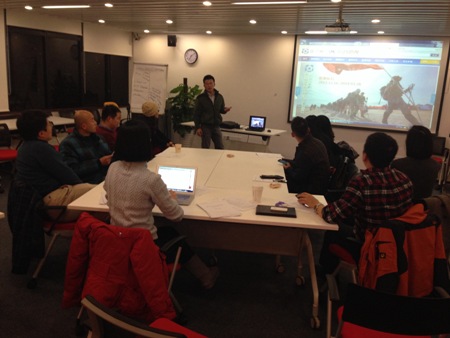
Another game organizer, Ms. Sophia Song (Global MBA 2013), introduced game registration status and team selection rule (including physical test, health examination). As of 12 February , there are 25 MBS China alumni registered the game. Sophia also initiated the discussion on the sponsorship and MBS internal/ external promotion plan. Meeting attendees were in hot discussion over the issues.
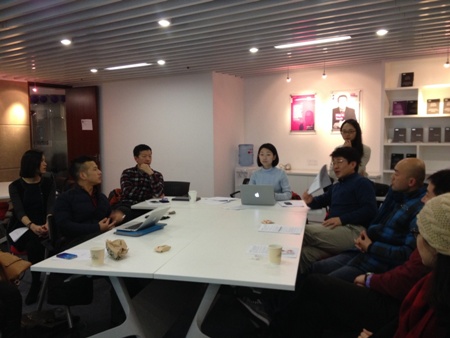
Mr. Simon Wang (Global MBA 2012) had experience in living in desert for his childhood. He shared the knowledge of climate and environment and how to tackle with the potential difficulties and challenges that game player will encounter during the competition.
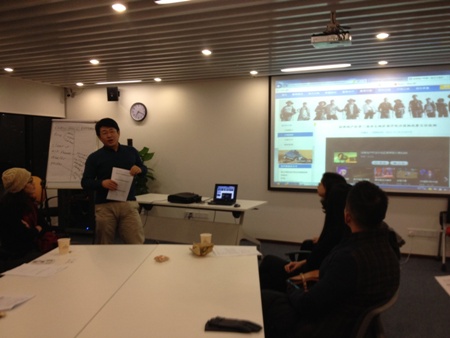
At the end of the meeting, Ms. Yiyi Chen, on behalf of Ms. Sherry Fu, MBS China Centre Director, gave the best wishes to this game. MBS will provide full support to the participant team.
 |
|
 |  |
China Economic Review Interview
MBA News caught up with Professor Fiona Devine, Head of Manchester Business School, and Professor Keith Brown, Vice President of the University of Manchester, during their recent trip to Shanghai to open the MBS China Centre in the city.
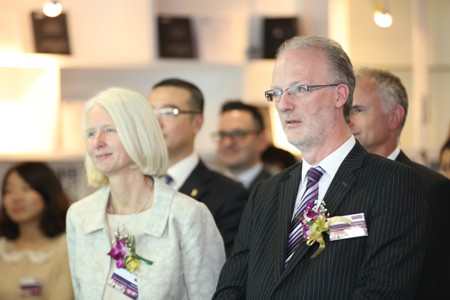
MBA News caught up with Professor Fiona Devine, Head of Manchester Business School, and Professor Keith Brown, Vice President of the University of Manchester, during their recent trip to Shanghai to open the MBS China Centre in the city.
We discussed the school’s new Global EMBA, expanding its presence and network in China and why the City of Manchester is a great attraction for Chinese students.
MBA News: Can you explain the recent developments on the MBS Global MBA program, and what’s behind these changes?
Fiona Devine: The program was originally three years and now it has dropped to two and a half years. It is in the [first] two years where they [the students] do most of the coursework and different workshops and it’s the final part in the fifth semester where they do a major piece of project work. And that’s where we really press upon original thinking to get the students to put into practise everything that they have learned in the courses in the previous two years. That is a really critical experience as part of that program.
I think it [the change] is being led by student demand. They wanted to have a tighter program and it makes sense in relation to our competitors that also have a tight program. So now within the first part of the program, they have a very intense period of study, they want to make the best of their time and are keen to get on, while then at the back end of the program is where they do most of their project work.
MBA News: MBS is now launching a Global EMBA. What can you tell us about this program?
Fiona Devine: Well, the idea of launching this program is partly to separate it out from our existing offering, so our MBA program that we offer at the moment is for middle level executives who have got about four or five years of experience. With the executive MBA program, we are now looking for people who’ve got 10 or more years of experience so they’re really people moving into, if not there already, quite senior managerial positions.
So again, there’s a variety of courses that we expect people to do as part of the program but then there’s an extensive range of activities around it in terms of learning about new challenges within the working environment, about flexibility, resilience across different market conditions, emotional intelligence, networking. It’s offering a wider suite of activities around the courses that we also offer as well as that distinctiveness in terms of practice-based learning.
MBA News: How important is China in your considerations when designing new programs such as the Global EMBA?
Fiona Devine: Extremely important. As you know we have seven centres around the world and the Shanghai and Dubai offices are our most successful and we really do see these two centres as critical to our success.
So the Shanghai enter is very important to us. We largely recruit Chinese nationals that work for international companies to do the Global MBA and we imagine that will be the case with the Global Executive MBA.
MBA News: What is the goal for the MBS centres in the next few years?
Fiona Devine: We want to have a reputation for both attracting high-quality students but then giving them a top rate student experience so that they’re going out and they’re representing us, MBS, when going back into the business environment and that’s then, of course, critical for us in terms of our recruitment in the future.
We also attach a lot of importance to growing alumni, so the students that are graduating, they will be very important for us to keep in contact with them. They’re also critical for coming in and talking to the students that we have on our programs at the moment so we are really building up quite considerable cohorts of people that we have as students and then remain in contact with them after they have completed their studies with us and we will continue with that activity.
We continue to want to offer a very good, high quality product in our Global MBA so we want to continue to be successful in that market as we have just been discussing. We have just launched this global executive MBA, we’ll want to see that take off and build that up over time. And then we’re also launching a program, which we’re working with the Centre for Creative Leadership, that would involve a group of participants, I won’t say students because these a very high level executives, that will be based around four different locations as they’re doing the program so they will be based in the work shops in Britain and will also in the US, then they’ll be going out to Ethiopia for one project and then another project will be in China. So we’ll be looking to see all that develop and take off.
We’re also keen to be exploring how we can perhaps be doing more executive education through our global centres. So within the Manchester Business School, we have an executive development centre. A lot of that work is UK-based at the moment, it’s very prestigious. We work with, for example, BP, and offer a major program with them in collaboration with the faculty engineering and physical science where we do a lot of work on project management with engineers and so on. We’ve just won a major contract again in the UK to deliver training programs for high level managers in the National Health Service but what we would like to do is to use the global centres to now extend our activities there to be doing more executive education around the global centres that we have around the world.
Also, they are a platform for us for all different types of collaboration. We’ve got a close relationship with Tongji University in Shanghai, and also Shanghai Jiaotong University where we offer a DBA program. I gather we are the only university that offers a part-time DBA, which is particularly attractive. And so again, we’ll continue those collaborations and extend them and also be thinking not just about the teaching activity but also exploring whether the basis of the research collaborations here as well, so that will be important for us to extend that.
MBA News: Does MBS have plans for further cooperation with Chinese institutions?
Keith Brown: This is something that we’re developing all the time. Only last month, [UK] Chancellor [George] Osborne was here and he announced a major relationship between Peking University and Manchester University in genomic research, so that’s our medicine people and medicine people in Peking. So that’s very, very recent news. We’ve got all sorts of talks, relationships in areas like engineering, physical sciences, health. The Chinese government is showing more and more interest in social sciences, we’ve got a lot of capacity there, so there’s the opportunity to grow that as well.
So these will be evolving relationships and some of them will take time. Many of them will start around student exchanges et cetera and develop from that right through into full-blown research collaborations, so there’s a huge amount of potential there. And I think, too, what we’d like to see longer term is more UK students coming over to China as well as Chinese students going over to the UK and I think there’s more of our staff coming over and spending some time in China.
MBA News: MBS China Centre was launched in 2008. What are your expectations for the China Centre for the next five years?
Keith Brown: Well, see, when I came here last year, there was a smaller centre about half the size of this one, which had been running for four years. Now we’re in a nice big shinny new one and in five years, we’ll need another floor. I think to some extent, we can plan for a bit of growth but we’re mustn’t exceed ourselves and get carried away with overflowing admissions, but there’s no reason why the China centre here in Shanghai, or indeed the one down in Hong Kong, can’t get bigger.
As long as it gets bigger, they’re getting better because for the university’s reputation is absolutely essential so if you lose the reputation, you’re in trouble, so for us the quality is more important than the quantity. It’d be nice to see more students and obviously to see more revenue, to see more alumni, but more than anything else, we want to be known by employers that our graduates are the best in the market and we want our students to be going out there and saying, ‘yes, I had the best experience possible.’
MBA News: As the vice president of the University of Manchester, what is your most challenging job? And what’s the most enjoyable part of your work?
Keith Brown: Finding enough resources to bundle the fantastic things that my colleagues want to do. I mean, one of the great things about university is you’re working in a very creative environment. It’s just buzzing with people with good ideas whether it’s a new course that they want to teach or different ways of teaching or some new research venture, whether it’s individual work or collaborative work. All that requires money. Universities do their best to generate money but sometimes you’ve got to make quite tough decisions so it that can be a challenging bit of it. Do you back this particular research group or that one or do you put money into developing a distance-learning course here or there or whatever? I guess like any big organization, those are the sorts of difficulties senior managers have backing horses, if you like, and placing bets.
The most enjoyable bit is when people succeed in doing what they set out to do, whether that’s a student who comes to the university and three years later, graduates, they’re going off to get a good job, or whether that’s a colleague who’s discovered something or finished a book or won a research contract or whatever and seeing these things through thinking that’s what universities are here for, all the time being caught up in keeping the machine going, but actually what it’s about is allowing people to live their dreams, I guess, whether that’s a student or a professor, it doesn’t matter, they’re all pursuing some sort of dream.
MBA News: Students from China on the MBS programs have the opportunity to visit other centres in the MBS network. How do you attract Chinese students to visit Manchester?
Fiona Devine: I’m not sure we have to attract students to come to Manchester. As part of the program there is always an emphasis on how participants are being exposed to a global environment and if you are working in a business environment you have to understand foreign cultures and it is very important to do so. There is actually a lot of movement and it’s actually a very popular part of the program and attracts students to the program in the first place.
Keith Brown: Leaving aside the specific program there is just short of 3,000 Chinese students in Manchester University at this moment so that university actually has the highest number of Chinese students in the UK. So there is no difficulty in attracting Chinese students to come to Manchester; it’s a dynamic and exciting city and it seems somewhere where Chinese students feel very much at home.
Fiona Devine: Many of those [Chinese] will be students at MBS as well, often doing undergraduate degrees but also we have at MBS something like 22 specialist masters degrees and we have huge numbers of students again from China and of course elsewhere coming to do those programs as well. And also then coming back to China and getting high level jobs at both multinationals and Chinese companies.
 |  |
A First-Class UK Business Education in the Heart of Shanghai
- Nigel interviewed by Cityweekend Magazine
Since its establishment in 2008, the Shanghai branch of the Manchester Business School (MBS) has made it possible for Chinese students to receive the same prestigious business education that was once only available at the University of Manchester’s main campus in the UK. The Shanghai campus is the first MBS centre in mainland China and one of seven transnational centres overseen by MBS Chief Global Officer Nigel Banister.
Since its establishment in 2008, the Shanghai branch of the Manchester Business School (MBS) has made it possible for Chinese students to receive the same prestigious business education that was once only available at the University of Manchester’s main campus in the UK. The Shanghai campus is the first MBS centre in mainland China and one of seven transnational centres overseen by MBS Chief Global Officer Nigel Banister.
With students from 140 countries, MBS has always been known for the international diversity of its student body, “but in just the last few years, we’ve gained another reputation, and that’s for being global,” Banister says. “Our reputation as a global business school is quite outstanding. We are the largest off-campus MBA program out of any UK university.”
MBS sees Shanghai as a valuable city in which to build a student base. “As we’re a business school and Shanghai is the commercial capital of China, it seemed very sensible to come here,” Banister said. “Any development in the region will certainly be based out of Shanghai.”
Students at the Shanghai centre earn the same degree as at the MBS campus in Manchester, whose Master of Business Administration (MBA) program is ranked fifth in the world in terms of return on investment by leading business magazine Forbes. “Employers know that students at our centre here are the exact same quality as at our campus in Manchester,” Banister says. “The part-time, two-and-a-half-year Global MBA program at the Shanghai centre is a practical way that a mid-career executive in Shanghai can access a world-class MBA program without leaving their job.”
The centre currently has around 850 students, mostly mid-career executives in their mid-30s. “The Chinese students we’ve been able to attract have been very high-quality, very ambitious,” Banister says. “Many of them work for top global companies already, or else the education we provide will put them in a position to take on a management role in a global company. Some are in general management but in a lower position, others are engineers or people pursing a technical career who want to move into management.”
Courses are taught by MBS’ UK faculty and run on a block schedule. “We fly in professors for long weekends of teaching, and we use technology to link students up with our administration and support staff to prepare them for the professors,” Banister explains. “We are part of one of the top research universities in the UK, the University of Manchester, which means our faculty are at the cutting-edge of their subject areas.”
Professors use the world-famous “Manchester Method,” which focuses on hands-on, practical learning. “We teach through projects, through collaboration with other students,” Banister says. “It’s learning by doing. The way that we teach prepares people particularly well to be able to succeed in global companies.”
MBS Shanghai has important partnerships with top-notch Chinese universities in the city, including Jiaotong and Tongji. The school also benefits from a Talent Management Partnership with high-profile Chinese and international companies like Deloitte, Gree, Huawei and JCB. “We basically have a club of companies that work with us to recruit candidates for new jobs as well as encourage their existing executives to go through our program,” Banister explains.
In addition, students in their second year of the program have the opportunity to travel to MBS’ other global centres, which “helps students understand a range of views and build their network of contacts,” Banister says.
The Shanghai campus currently accepts around 180 students per year, with application deadlines in June and December for the two annual start dates in January and July. “We look to take the best applicants with strong academic credentials who have already performed well in their careers,” Banister says.
While pursuing a business degree mid-career is not unusual, MBS stands out among other, more-conventional MBA programs. “It’s a traditional path all over the world, but the non-traditional bit here is that you don’t have to come to our campus in Manchester,” Banister says. “It’s unusual because there aren’t many opportunities to take a world-class business program without leaving Shanghai.”
MBS is constantly expanding its global reach and has developed a brand-new Global Executive MBA program that will start in July. Students in the program will begin their studies in the UK and go on to visit three of MBS’ global centres, including Shanghai. “The program is one step up from the Global MBA, for senior executives looking to work at the highest level,” Banister says.
Banister feels that part-time MBA programs like those offered at MBS’ world centres represent the future of global business education. “All over the world, where MBS programs are still thought of as a prerequisite for management positions, full-time MBA enrollment has been declining for years,” he says. “Meanwhile, part-time enrollment has been increasing, and that’s because schools like ours are offering an alternative that’s credible and practical. Instead of losing their executives, companies find it very encouraging to develop their domestic executives through our part-time program.”
 |
|
 |  |
China Centre Welcome two New staff
Mr. Kimi Liang
Kimi joined MBS as student support officer in Feb 2014. Being a member of support team, like others, he provides day to day student support to students at the China Centre. He has over 8 years of working experience in technical support and data maintenance in a French multinational company. |  | Ms. Jasmine Wang
Jasmine Wang joined MBS China Centre in Mar 2014 as corporate and communication officer. She is responsible for developing corporate business and market communications with major partners as well as assisting China regional director on operation and GEMBA promotion. She had 7 years working experience on organizing business event, seminars and dealing with Chinese government relations at a British Organization. |  |
Two babies born to join MBS China Family
With the new China Centre grand opening, a double blessing has descended upon MBS China Centre. Two lovely babies, a daughter of Flora and a son of Livian were born. They will bring a thriving 2014 to the MBS’ family.
|
 |  |
March 2014
| Manchester Global MBA Application Guidance | MBS China Centre | 5 March, Wednesday, 2014 | Career Workshop | MBS China Centre | 6 March, Thursday, 2014 | Saturday Brunch- "How Female Professionals can Make a Difference" | MBS China Centre | 8 March, Saturday, 2014 | | Professor Talk on Game Theory: Patterns and Pre-dictions in Business | Hotel New Otani Chang Fu Gong | 12 March, Wednesday, 2014 | | MBS Alumni Networking Evening @Beijing | Hotel New Otani Chang Fu Gong | 12 March, Wednesday, 2014 | | Getting to know charity in China – Thinkadoption | MBS China Centre | 18 March, Tuesday, 2014 | | Manchester Global MBA Workshop Taster "Accounting" | MBS China Centre | 19 March, Wednesday, 2014 |
For more information and registration, please visit: http://www.mbs.ac.cn/events/upcoming?cid=201403
|
|
|